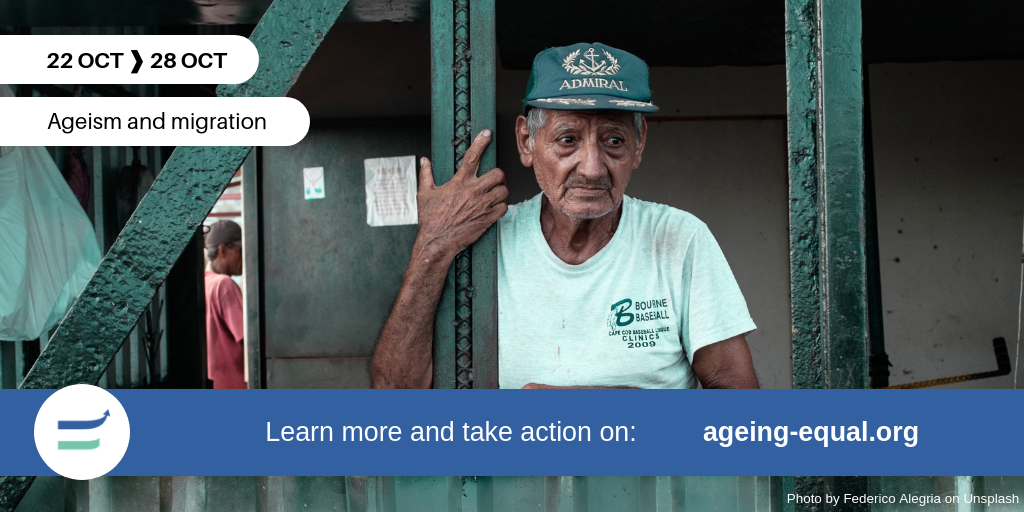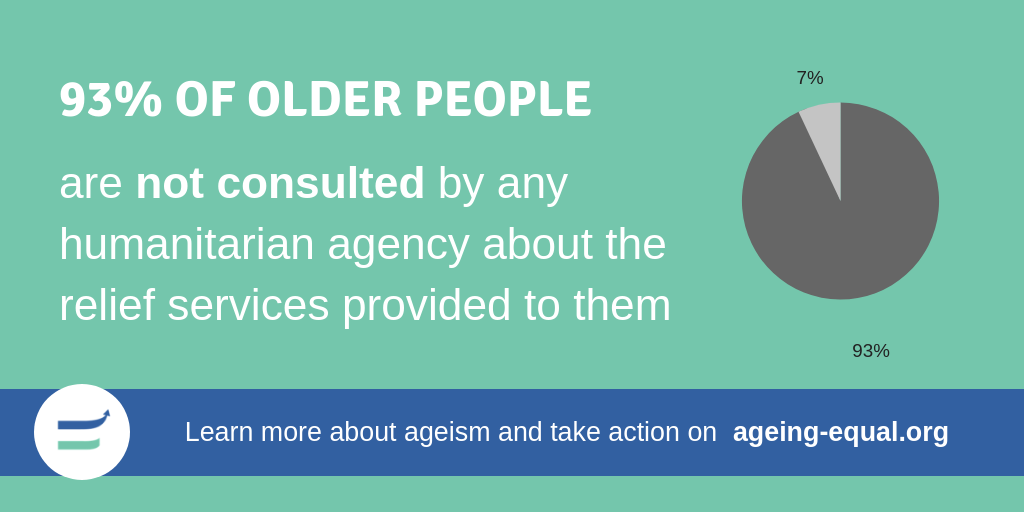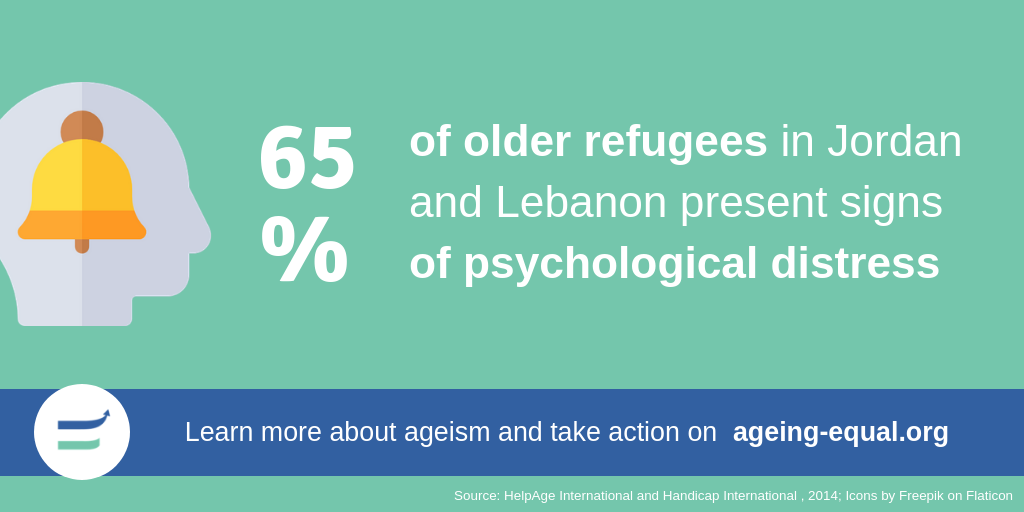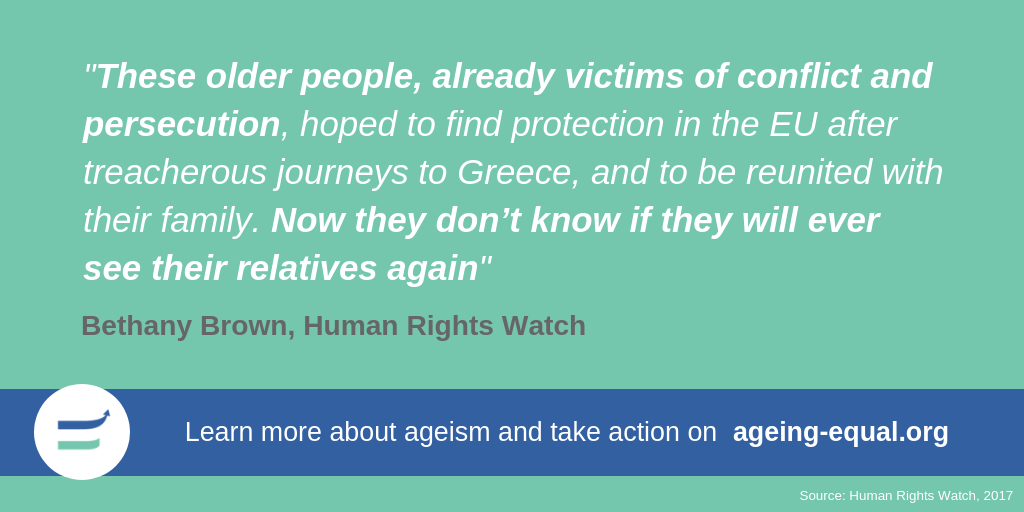‘We are not given any respect and support’: the 4th week of the #AgeingEqual campaign in a nutshell

Our fourth #AgeingEqual campaigning week looked at the experience of migration by older people. Many difficulties experienced by migrants in their journey and in the host country can be particularly harmful for older persons, especially when they are in need of care. Resourceful blogposts showed the pervasiveness of ageism in the humanitarian sector and the double-burden of ageism and racism when migrants age in a host country. The stories from non-Europeans now living in the continent will feed you with concrete examples of how one’s rights to decide for him/herself can sometimes be at stake when one’s culture differs from the culture of the host country. Immerse yourself into their realities with this week wrap-up!
Experts discussed the impact of ageism in migratory contexts
- During forced displacements, ageism is a barrier for older people to accessing help.
- Older people can have trouble accessing humanitarian assistance due to mobility problems.
- Migrants who age in another country are more likely to face isolation, poverty and ill-health.
- Women in particular are exposed to high risks of poverty due to a lack of control over their finances.
- Language and cultural barriers further hinder the capacity of older migrants to find services and/or institutions that would help them meet their care needs. The social roles given to older adults, as well as the challenges that often come with older age (such as dementia), are interpreted differently from one culture to another; yet, these cultural gaps are often overlooked by care professionals.
Read them all! Find all blogposts, testimonies, good practices posted in relation to our thematic focus ‘ageism and migration’ with the dedicated tag. Grow your understanding of ageism and spread the word!
Older migrants added their voice to raise consciousness of their vulnerability
- The one of Tina, a Chinese national working in Belgium reflecting on the difficulties of her fellow nationals to make their later life choices heard in Western societies
- The one of Norman, testifying of the isolation experienced by older adults with a migrant background
- The one of Fifi, volunteering for an organisation giving ‘cultural-sensitive working’ courses
- The one of Monica, shedding light on the barriers migrant women as they approach retirement age
- The one of Sait, ageing with a disability in Italy where he moved to start a new professional career
Do you want to share your experience of ageing? Contact us to give visibility to more examples of age discrimination with a blogpost. You can also use the hashtag #AgeingEqual to add your voice in social media!
YouTube Rinia Silvia (76y) helps her mother. She can do that thanks to her friends. ‘Friendship and education are basis for good living’. Education don’t stop bij getting old @AGE_PlatformEU #migrants #genero #nuzo #zif @NetwerkNOOM https://t.co/8WUIkAR92G
— juan seleky (@jseleky) October 26, 2018
And new allies joined our movement against ageism
The #AgeingEqual campaign was mainly animated this week thanks to the precious contributions of partners working at European and international levels – including in the global South and in conflict zones. We warmly thank you: Human Rights Watch, HelpAge International, the European Network for Intercultural Elderly Care, the European Network of Migrant Women as well as researchers from the COST Action on ageism, in particular the Center for Health and Migration Vienna who contributed for this week on ageism and migration.
You kept spreading the word too and we once more applause your determination to work with us in fighting against ageism!
Older migrants in Europe are often invisible and underserved by welfare and care, despite problems like loneliness, knowledge and language problems. Members of @ENIEC across Europe work hard on improving care for older migrants. Supported by #AgeingEqual https://t.co/g9eE2bNCXk
— Kristel Logghe (@Multivation) October 24, 2018
#ageism is so pervasive in our societies we don’t even recognise it when we see or hear it. This includes in all sorts of #humanitarian contexts where ageism prevents truly inclusive humanitarian response and implementation of humanitarian principles. https://t.co/XJnfcSILv8
— madeleine mcgivern (@madeleinejm) October 22, 2018
@AGE_PlatformEU lance une grande mobilisation contre l’#âgisme. Chaque semaine un nouveau thème. Cette semaine âgisme et migrant #AgeingEqual https://t.co/hG40r5Lgci
— Oldyssey (@Oldyssey) October 22, 2018
The next week (29 October-4 November) of this 70-day campaign will be dedicated to ageism and intergenerational solidarity. Ageism affects both younger and older age groups ; let’s join forces to tackle stereotypical thinking and discriminatory attitudes on the ground of age.
Together We Can Make A Difference!
Share your story using the hashtag #AgeingEqual
and help us shine a spotlight on ageism.
Read our previous weekly highlights:
‘Older women carry on – as they always do’
the 2nd week of the #AgeingEqual campaign in a nutshell
A first week of campaigning for ageing with equal rights!






Facebook Comments